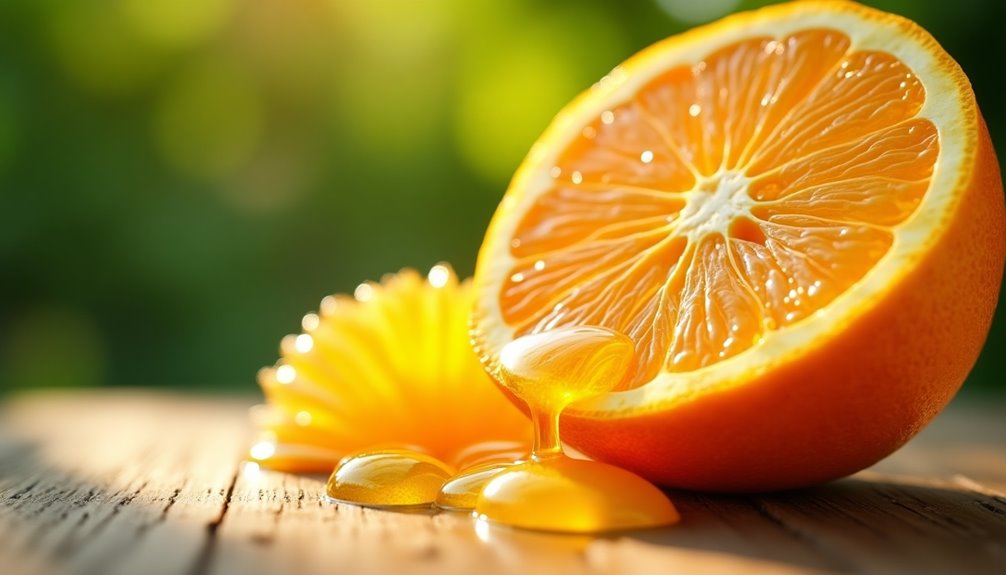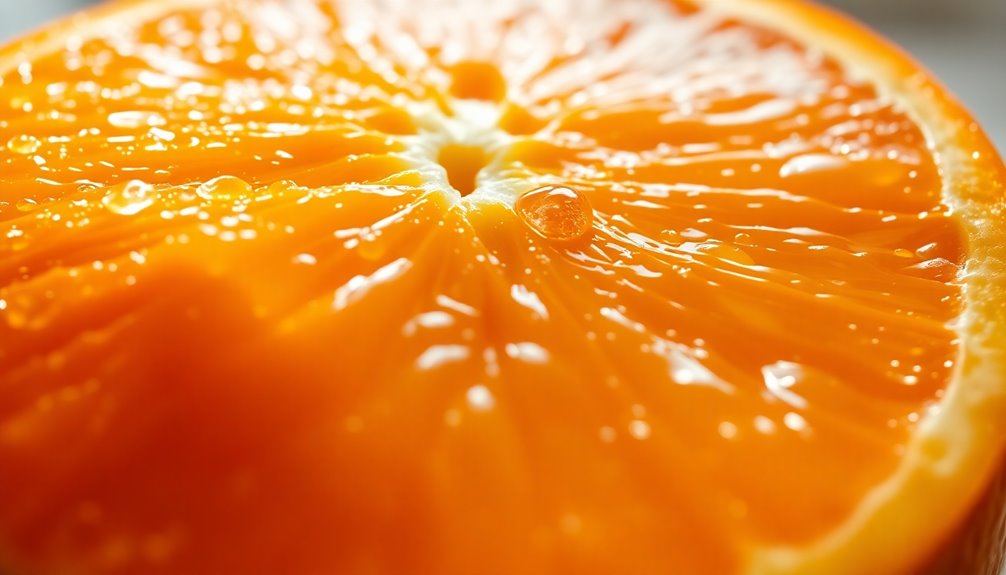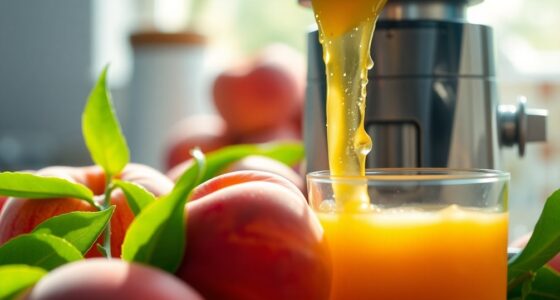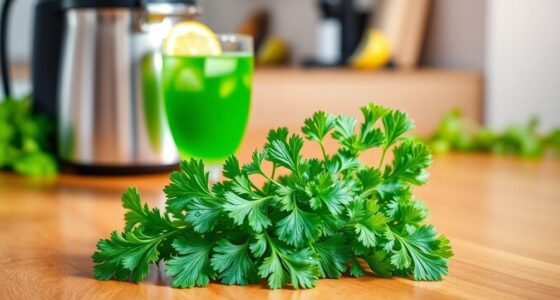A medium-sized orange typically gives you about 4 to 5 tablespoons of juice, which is around 1/4 to 1/3 cup. To get a full cup of juice, you'll need about 3 to 4 oranges. Some varieties, like Valencia and Navel oranges, tend to be juicier, so choosing the right type can make a difference. Freshness and ripeness also play a big role in how much juice you'll squeeze out. There's even more to explore about juicing oranges!
Key Takeaways
- A medium-sized orange yields approximately 4 to 5 tablespoons of juice, or about 1/4 to 1/3 cup.
- To obtain 1 cup (8 ounces) of juice, you'll need about 3 to 4 medium-sized oranges.
- Each medium-sized orange typically produces around 2 to 3 ounces of juice, depending on the variety.
- Valencia and navel oranges are known for their high juice content, enhancing overall yield.
- Freshness and ripeness significantly affect juice extraction; ripe oranges yield more juice.

Have you ever wondered just how much juice you can get from an orange? It's a common question, especially if you're planning to whip up a refreshing glass of homemade orange juice. The answer might surprise you! On average, a medium-sized orange yields about 4 to 5 tablespoons of juice, which translates to roughly 1/4 to 1/3 cup. This means that if you're looking to fill a standard glass, you'll need a few more oranges than you might expect.
To put it in perspective, if you want to obtain 1 cup—or 8 ounces—of orange juice, you're going to need about 3 to 4 medium-sized oranges. That's right! It can take more than a couple of these juicy fruits to get a full serving. Each medium-sized orange typically gives you around 2 to 3 ounces of juice. This yield can vary based on the type of orange you're using, with some varieties being juicier than others. For instance, Valencia and navel oranges are particularly known for their high juice content, making them a fantastic choice for juicing.
If you're curious about how many tablespoons of juice you can get from a pound of oranges, it generally contains around 2 medium-sized fruits. These two oranges can yield about 8 to 10 tablespoons of juice. So, if you ever find yourself at the grocery store, keep in mind that a pound of oranges can give you a decent amount of juice for your morning drink or cocktail.
When squeezing oranges for juice, the freshness and ripeness of the fruit also play a significant role in the yield. A ripe, juicy orange will usually produce more juice than one that's past its prime. You might find that a well-chosen navel or Valencia orange can provide you with the maximum juice yield, so be sure to pick the best ones at the market.
If you're looking to make a big batch of orange juice, you might want to consider how many oranges you'll need ahead of time. For every 8 ounces of juice you aim to make, just remember that 3 to 4 medium-sized oranges should do the trick. It's always a good idea to have a few extra on hand, just in case you want to squeeze out those last few drops.
Frequently Asked Questions
How Many Oranges for 8 Oz of Juice?
To get 8 ounces of juice, you'll typically need about four medium-sized oranges.
Each orange usually gives you around 4 tablespoons, which adds up to roughly 2 ounces per fruit.
So, when you're squeezing, keep in mind that you're aiming for that total.
Depending on the size and ripeness, you might need a little more or less, but four oranges should generally do the trick for your 8-ounce goal.
How Many Ml of Juice Are in an Orange?
When you squeeze an orange, you'll typically get between 60 to 75 milliliters of juice from a medium-sized one.
If you pick a large orange, expect around 90 to 105 milliliters.
The exact amount depends on the size, variety, and ripeness of the fruit.
Juicier varieties, like Valencia, will give you more.
How Much Is in the Juice of One Orange?
When you squeeze an orange, you can expect to get about 4 to 5 tablespoons of juice from a medium-sized fruit.
That's roughly 1/4 to 1/3 cup.
Keep in mind that the exact amount can vary based on the orange's size, ripeness, and type.
Some oranges, like Valencia, might give you a bit more juice compared to others.
How Many Oranges Does It Take to Make 16 Oz of Juice?
When you're craving a refreshing glass of orange juice, you'll need about 8 medium-sized oranges to fill 16 ounces.
Each orange brings its own burst of sunshine, typically yielding around 2 to 3 ounces of juice. If you pick ripe, juicy ones, you’ll enjoy the fullest flavors. To truly appreciate the refreshing taste, it’s helpful to know how much juice is in an orange, which can vary depending on its size and ripeness. On average, a medium-sized orange contains about 1/4 to 1/3 of a cup of juice, making it perfect for breakfast or as a delightful addition to various recipes. With every sip, you’ll experience the vibrant essence of citrus that brightens your day.
Conclusion
So, the next time you pick up an orange, think about what's inside. Will it be bursting with sweet juice, or leave you wanting more? It's a gamble, isn't it? On average, you can expect about 1/4 to 1/3 cup of juice from each fruit, but that can vary wildly. What if you discover the juiciest orange you've ever tasted? Or maybe it'll be a dry disappointment. Only one way to find out—go grab an orange!
Cindy thoroughly researches juicing trends, techniques, and recipes to provide readers with practical advice and inspiration. Her writing style is accessible, engaging, and designed to make complex concepts easy to understand. Cindy’s dedication to promoting the advantages of juicing shines through her work, empowering readers to make positive changes in their lives through the simple act of juicing.











